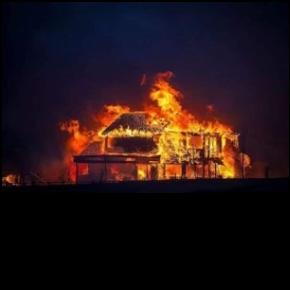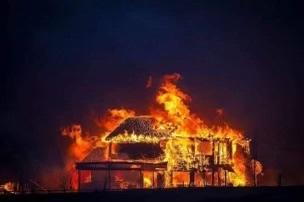Coping with Disaster

Coping with Disaster
 It was Thursday, the day before New Year's Eve, December 30, 2021. The sun was shining, but the wind was gusting. I was walking my dog when I noticed a cloud of smoke in the distance. I thought nothing of it because it appeared to be a grass fire. After my dog completed her business, we headed back to my condo. It was astonishing how fast the smoke covered the neighborhood. As I sat at my desk, I noticed my eyes became irritated, and the smell of smoke filled the apartment. When I looked out my window, it shocked me to see black smoke throughout the entire neighborhood. Soon, there was a pounding at my door. The police politely but firmly ordered me out of the condo when I opened it. My neighbors were also in the corridor. All of us went back inside to gather a few things, and we left the condominium complex.
It was Thursday, the day before New Year's Eve, December 30, 2021. The sun was shining, but the wind was gusting. I was walking my dog when I noticed a cloud of smoke in the distance. I thought nothing of it because it appeared to be a grass fire. After my dog completed her business, we headed back to my condo. It was astonishing how fast the smoke covered the neighborhood. As I sat at my desk, I noticed my eyes became irritated, and the smell of smoke filled the apartment. When I looked out my window, it shocked me to see black smoke throughout the entire neighborhood. Soon, there was a pounding at my door. The police politely but firmly ordered me out of the condo when I opened it. My neighbors were also in the corridor. All of us went back inside to gather a few things, and we left the condominium complex.
These same neighbors drove us to Erie, away from the fires and smoke. We were on the way to my daughter's house as they did the same. As we drove, we somberly viewed the dark smoke and flames. All of us were grateful to have escaped what turned out to be a major disaster.
We learned later that the county lost 1,000 homes were in flames. So miraculously, only two fatalities resulted from something that could easily take thousands of lives. However, the shock and trauma were unbearable.
I lived with my daughter- and son-in-law for four days and was ready to go home.
The drive home was more shocking than the escape from the thick smoke. As we passed neighborhoods close to the condominium where I live, what came into clear view were entire neighborhoods burned down to the ground. In many places, there was nothing left standing. Just four days ago, beautiful, suburban homes occupied the spaces where, now, there was nothing but ash. I could not help but think, which has the feel and look of war. The only element missing from the total disaster was bombs and gunshots.
Miraculously, only two people died in the raging fire. Of course, any death is a tragedy, but it could have been worse.
Besides the loss of life and homes, people lost valuables irreplaceable. Among these are family heirlooms, diaries written by grandparents and great-grandparents, and invaluable photographs, among many others.
When I arrived home, more than a little shaken from all that happened, I immediately understood that I was fortunate. My condominium community, with its two buildings and many apartments, was intact. The corridors had the smell of smoke, as did my unit. However, there was no destruction of my apartment and possessions. More than that, my family escaped with their houses spared and their lives intact.
Everyone I have spoken to about this wildfire states, almost uniformly, that the past year has been dreadful and has left all of us in a state of shock. Among those shocking things are the pandemic, political instability that threatens our democracy and freedom, economic volatility partly caused by the Coronavirus, and the vast numbers of hospitalizations and deaths because of this disease that remains ongoing. As part of this calamity, we must include the need to isolate ourselves in our homes to halt the spread of the disease.
Understanding the emotions and normal responses that follow a disaster or other traumatic event can help all of us cope with feelings, thoughts, and behaviors.
_______________________________________________________________________________
Recovering emotionally from disaster
*From The American Psychological Association, 2013
Disasters such as hurricanes, earthquakes, transportation accidents, or wildfires are typically sudden and overwhelming. Many people have no outwardly visible signs of physical injury, but there can be an emotional toll. It is common for people who have experienced disaster to have strong emotional reactions. Understanding responses to distressing events can help you cope effectively with your feelings, thoughts, and behaviors and help you along the path to recovery.
What are common reactions and responses to disaster?
Following a disaster, people frequently feel stunned, disoriented, or unable to integrate distressing information. However, once these initial reactions subside, people can experience a variety of thoughts and behaviors.
Typical responses can be:
- Intense or unpredictable feelings. You may be anxious, overwhelmed, or grief-stricken. You may also feel more irritable or moody than usual.
- Changes to thoughts and behavior patterns. You might have repeated and vivid memories of the event. These memories may occur for no apparent reason and may lead to physical reactions such as a rapid heartbeat or sweating. It may not be easy to concentrate or decide. Sleep and eating patterns also can be disrupted. Some people may overeat and oversleep, while others experience a loss of sleep and appetite.
- Sensitivity to environmental factors. Sirens, loud noises, burning smells, or other environmental sensations may stimulate memories of the disaster, creating heightened anxiety. These "triggers" may accompany fears that the stressful event may repeat.
- Strained interpersonal relationships. Increased conflict, such as frequent disagreements with family members and coworkers, can occur. You might also become withdrawn, isolated, or disengaged from your usual social activities.
- Stress-related physical symptoms. Headaches, nausea, and chest pain may occur and require medical attention. Disaster could affect preexisting medical conditions-
related stress.
How do I cope?
Fortunately, research shows that most people are resilient and can bounce back from tragedy. It is common for people to experience stress in the immediate aftermath. Still, most people can resume functioning as before the disaster within a few months. It is important to remember that resilience and recovery are the norms, not prolonged distress.
- Survivors need time to adjust and expect that this will be a difficult time in the lives of survivors. Allow yourself to mourn the losses you have experienced and try to be patient with changes in your emotional state.
- Ask for support from people who care about you and who will listen and empathize with your situation. Social support is a crucial component of disaster recovery. Family and friends can be vital resources. You can find support and common ground from those who've also survived the disaster. You may also want to reach out to others not involved who may provide more significant support and objectivity.
- Communicate your experience. People need to express what they feel in whatever ways they feel comfortable, such as talking with family or close friends, keeping a diary, or engaging in a creative activity.
- Find a local support group led by appropriately trained and experienced professionals. Support groups are frequently available for survivors. Group discussion can help survivors realize they are not alone in their reactions and emotions. Support group meetings can be beneficial for people with limited personal support systems.
- Engage in healthy behaviors to enhance your ability to cope with excessive stress. Eat well-balanced meals and get plenty of rest. If you experience ongoing difficulties with sleep, you may find some relief through relaxation techniques. Avoid alcohol and drugs because they can be a numbing diversion that could detract from and delay active coping and moving forward from the disaster.
- Establish or reestablish routines. Routines can include eating meals regularly, sleeping and waking regularly, or following an exercise program. Build positive ways to have something to look forward to during these distressing times, like pursuing a hobby, walking through an attractive park or neighborhood, or reading a good book.
- Avoid making major life decisions. Switching careers or jobs and other essential decisions tend to be highly stressful and even harder to take on when someone is recovering from a disaster.
When to seek professional help?
Persistent feelings of distress or hopelessness and you feel you can barely get through your daily responsibilities and activities, consult with a licensed mental health professional such as a psychologist. Psychologists have the training to help people address emotional reactions to disasters such as disbelief, stress, anxiety, and grief and make a plan for them.
For trauma therapy, contact Dr. Allan N Schwartz, PhD
Email: [email protected]
